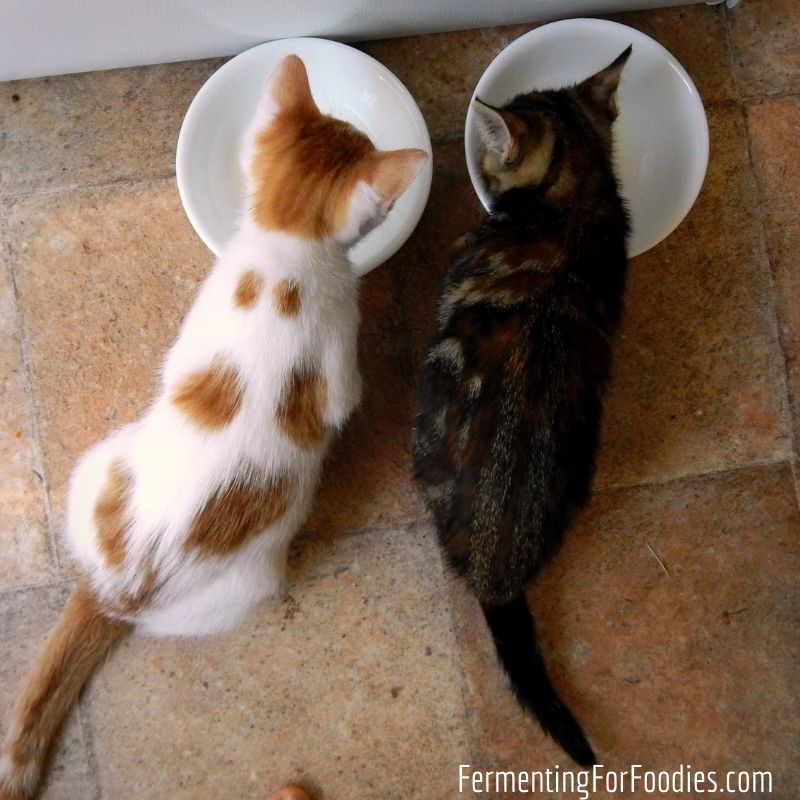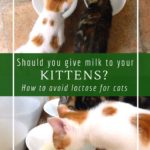Wondering what kinds of fermented foods are safe for pets? Here’s everything you need to know about feeding your cat or dog fermented foods and probiotics.

When we first got our kittens, I was surprised by my sudden burst of mothering instinct. They were so small and helplessly adorable. I wanted to do everything I could to take good care of them.
That included buying an assortment of high-quality pet food (along with a bunch of other pet supplies that I never foresaw owning). Naturally, I read the ingredients on the pet food bags, comparing the amount of protein, and the ratio of peas and potatoes to chicken. I also noticed that most of the brands included fermented and “probiotic” ingredients.
I’m a big skeptic of products claiming to be probiotic because they contain a pinch of dehydrated culture. If properly produced and refrigerated probiotic supplements aren’t a robust source of probiotics, then how likely is it that a bag of dried cat food is?
Probiotic Options
A quick search turned up several brands of probiotic supplements specifically designed for pets. Unfortunately, it’s hard to be sure whether your cat or dog will get any benefits from these sorts of supplements.
However, fermented foods are always a guaranteed source of probiotics. As well, fermented foods are more likely to survive digestion.
Here is some general advice to follow before feeding your dog or cat fermented foods:
- Not all human foods are safe for cats and dogs. Be sure to double-check before feeding any human foods to your pet.
- New probiotic foods can cause digestion issues. Always start with a small amount to avoid any digestive upsets. Start with 1-4 tsp of food depending on the size of your pet.
- Avoid any sugar-based ferments (kombucha, jun, water kefir). Pets don’t have great oral hygiene and the sugar/acid combo is not great for their teeth.
- Avoid giving them too much of a salty ferment. If you want to give them fermented vegetables, then rinse the salty brine off first.
Fermented foods for pets
Here are a few fermented foods that are safe for pets. Be sure to follow the advice above to prevent any digestive problems.
- Milk kefir: Cats and dogs are lactose intolerant. However, well-fermented milk kefir is low in lactose. They also LOVE dairy, so a little bit of kefir once in a while is much better than giving them the leftover milk in your bowl of cereal.
- Yogurt: Pets just love dairy. Like kefir, yogurt is lower in lactose and full of probiotics. Just avoid feeding them store-bought brands with added sweeteners or flavor.
- Sauerkraut: Cabbage is perfectly fine for pets. If you want to give your furry friends some probiotic sauerkraut, make them their own little jar without any added spices or flavors. Just salt and cabbage is perfect. Then rinse off the salt before feeding it to them.
- Pickled carrots: Carrots are another really pet-friendly vegetable. Dice plain fermented carrot sticks into bite-sized pieces and rinse off the excess salt for a deliciously crunchy treat.



Hi! Thank you for the great content on a range of fermenting techniques and plethora of awesome recipes. I was wondering if left-over whey can be given to cats?
Yes! It’s very low in lactose. However, my cats are pretty picky… they don’t like their dairy to be too sour and won’t drink whey. 🙂
Can you give cats and dogs nut milk based yogurts and kefir?
In general, nuts aren’t healthy for pets. However, they aren’t toxic. Nut milk can also cause digestive upset. So, while it’s not toxic, I would only give them a little bit of nut milk yogurt. Cheers, Emillie